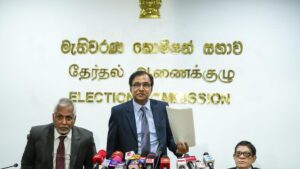ButSpeak.com
News which Matters.

Sri Lanka’s presidential election will take place on September 21, with incumbent President Ranil Wickremesinghe facing significant challengers in the country’s first three-cornered race.
Sri Lanka’s presidential election is scheduled for September 21, 2024, marking a pivotal moment for the island nation’s political landscape. This election will be the first opportunity for around 17 million voters to choose their leader following the ousting of former President Gotabaya Rajapaksa through a significant popular uprising two years ago.
Incumbent President Ranil Wickremesinghe has officially declared his candidacy, making a cash deposit at the Election Commission as an independent contender. Although Wickremesinghe has relied on the Sri Lanka Podujana Peramuna (SLPP), the party formerly associated with the Rajapaksas, his bid represents a significant shift in Sri Lankan politics. Since assuming the presidency through an urgent parliamentary vote after Rajapaksa’s resignation amidst the 2022 economic crisis, Wickremesinghe has focused on economic recovery through an IMF-led reform program. Despite his efforts, his administration faces substantial criticism over rising living costs and demands for higher wages.
At 75, Wickremesinghe brings a wealth of political experience, having served as Prime Minister six times and as President for the past two years. However, he has never won a presidential election through popular vote, a fact that may influence his campaign strategy.
The upcoming election will feature a competitive three-cornered race. In addition to Wickremesinghe, the main challengers are Sajith Premadasa, the leader of the Opposition, and Anura Kumara Dissanayake, the head of the National People’s Power (NPP) alliance. Both opponents have pledged to tackle corruption and address economic hardships through a revised IMF agreement, contrasting with the incumbent’s approach.
The SLPP has yet to announce its candidate, with speculation suggesting that it might field someone outside the Rajapaksa family. Additionally, other notable figures, including former army chief Sarath Fonseka and Justice Minister Wijeyadasa Rajapakshe, have expressed their intentions to run.
A coalition of northern Tamil parties is proposing a “common Tamil candidate,” though this idea faces skepticism within Tamil political circles. As Sri Lankan presidential candidates seek to appeal to a fragmented Sinhalese majority and various ethnic minorities, including Tamils and Muslims, the election promises to be a critical juncture in the nation’s political evolution.